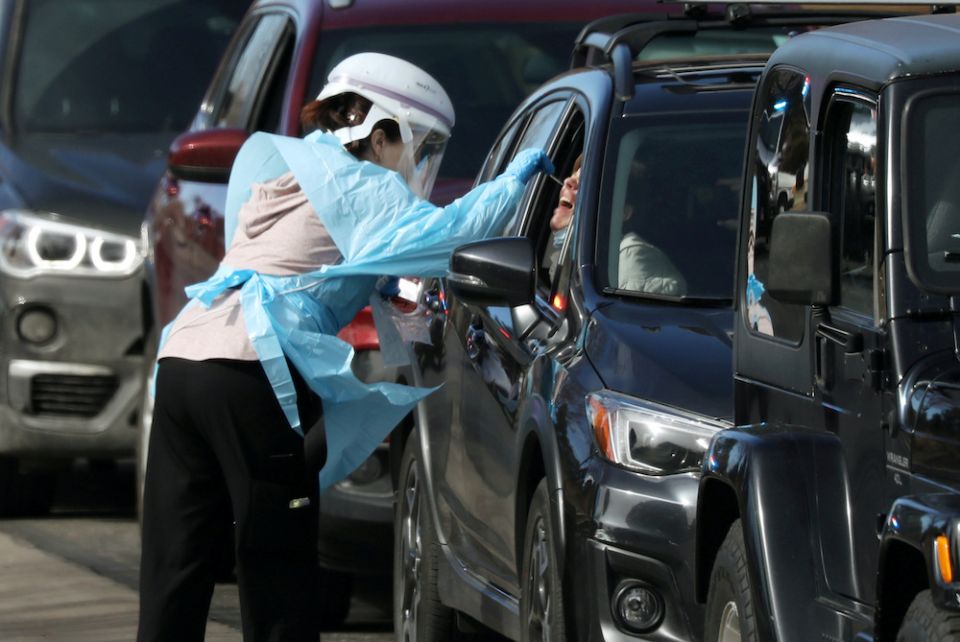
A health care worker in Denver tests people for the coronavirus at a drive-thru testing station March 11. (CNS / Reuters / Jim Urquhart)
Alone, or with a partner, consider the following:
- What is the hardest thing about living in isolation from other people?
- How does it feel to watch news reports about healthcare workers and civic leaders responding to the coronavirus crisis?
- What do you pray God would do to make things better?
At times we might feel helpless in the face of so much distressing news, but there is good news to be discovered. Catholic sisters have a legacy of service in the fields of healthcare and social services. Their efforts are making a hopeful difference amid this current crisis.
Sisters in health care, advocacy and immigration respond to expanding needs of coronavirus situation
by Dan Stockman
COVID-19, the infection caused by the coronavirus sweeping the planet, can be invisible, insidious and deadly, but Catholic women religious and the organizations they created or run are at the forefront of efforts to stop it.
Health care is key to overcoming the pandemic, and the more than 2,200 hospitals, nursing homes and other health care facilities and organizations of the Catholic Health Association of the United States are not only testing and treating patients, but advocating for more supplies, equipment and coordination.
In a March 18 letter to the Trump administration and congressional leaders, CHA joined 17 other national health care organizations calling on the federal government for "a stable, continuous supply of needed medical supplies for clinical labs and technicians, health care providers and health care facilities," an increase in patient capacity, continued access to medications and an end to supply-chain interruptions.
"CHA and our partners from other health care organizations recognize the critical importance of the private sector and the government joining together for an urgent national response to this public health emergency," Mercy Sr. Mary Haddad, CHA president and CEO, said in a statement. "Our members are on the front lines caring for those affected, and we must do everything we can to ensure they have the necessary resources to treat patients and be protected while delivering care."
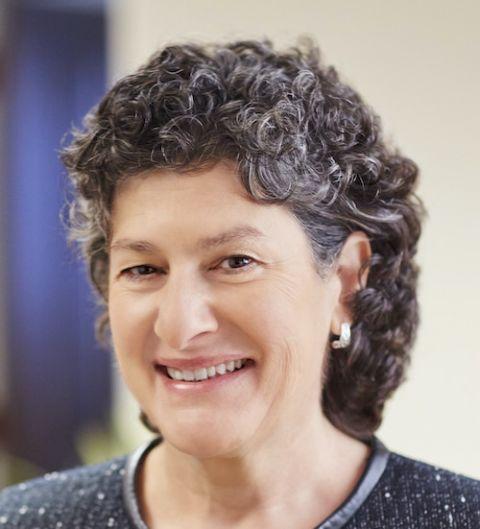
Mercy Sr. Mary Haddad, president of the Catholic Health Association (Courtesy of CHA)
The first COVID-19 patient in the United States was treated at a Catholic hospital, CHA reported: Providence Regional Medical Center in Everett, Washington, part of the chain of hospitals the Sisters of Providence started after their arrival in 1856.
CHA has created a page on its website dedicated to COVID-19 resources and information.
Sr. Jayne Helmlinger, a Sister of St. Joseph of Orange, California, and president of the Leadership Conference of Women Religious, said crises like this one show the dedication of those at every level in health care. Helmlinger spent 25 years as a health care executive, culminating in her role as the executive vice president of mission integration for St. Joseph Health in Irvine, California, a position she held from 2005 until she was elected general superior in 2011. St. Joseph Health is part of Providence St. Joseph Health, which has 51 hospitals across the western United States.
She said the philosophy in Catholic health care is the opposite of those hoarding food and toilet paper.
"I've talked to our system and regional CEOs, and I have so much faith in our caregivers," Helmlinger said. "They're an incredible team and they're in it together, thinking about the patients and their families."
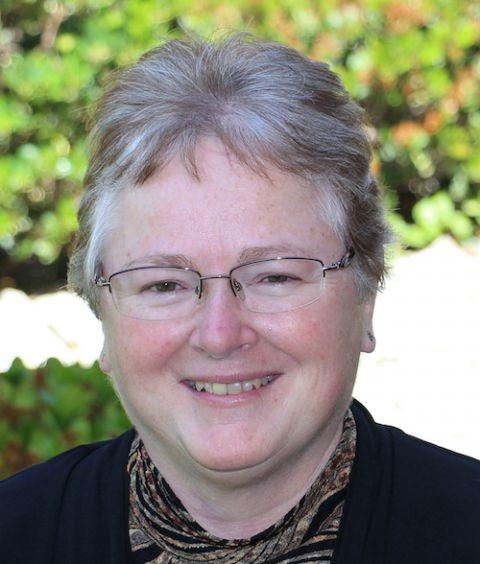
St. Joseph Sr. Jayne Helmlinger of the Sisters of St. Joseph of Orange, California (Provided photo)
"They don't panic. They think communally first," Helmlinger said. "It's: 'How can we do this?' They need each other, and they know that."
That dedication to the public good extends to putting aside the desire to be with their own families. When the Tubbs fire in 2017 devastated Santa Rosa, every hospital executive but one lost their homes, Helmlinger said, but all of them continued working.
"It's community first," she said. "It's really something to watch, and especially when you're in a crisis, you just see their professionalism, their compassion and their ability to put the patients at ease. You're going to be cared for if you're coming in."
Helmlinger said the hospitals have been preparing for the wave of patients they know COVID-19 will bring to their doors, talking to doctors in Asia to learn of their experiences fighting the virus and ensuring networks are ready to move supplies, equipment or even patients as needed.
"This is a time when we all come together," she said. "It's not 'every hospital for itself.' "
From her perspective as a superior and as LCWR president, Helmlinger said religious communities across the country have been protecting elderly sisters, who are especially vulnerable to the virus, and providing resources for their congregations and the surrounding communities.
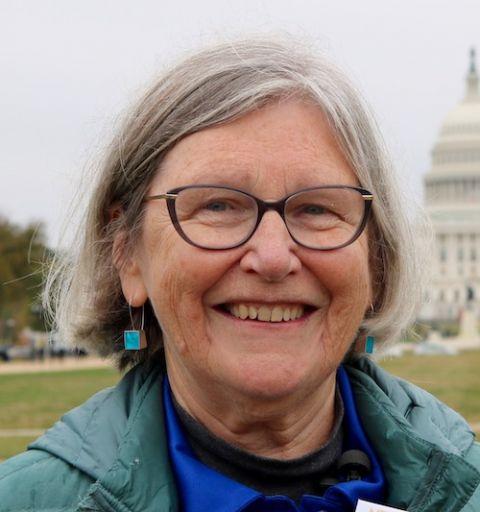
Social Service Sr. Simone Campbell (Courtesy of Network Lobby for Catholic Social Justice/Colleen Ross)
Social Service Sr. Simone Campbell, executive director of Network, a Catholic social justice lobby, noted that March 23 was the 10th anniversary of the Affordable Care Act's passage into law and said the pandemic shows how badly the United States needs expanded access to health care.
"The coronavirus has exposed the gaps that leave our nation vulnerable. Just like we did 10 years ago with the ACA, let's mend the gaps," Campbell said in a written statement. "People with the coronavirus have a communal duty to seek medical help, and our nation has a communal duty to ensure that cost doesn't get in the way of their diagnosis and treatment. This is an anniversary to celebrate AND use as a springboard to ensure that all of our people have quality, affordable, accessible, and equitable health care."
Presentation Sr. Mary Thomas, vice president of mission service at Avera McKennan Hospital in Sioux Falls, South Dakota, said the crisis is especially acute in rural areas, where medical resources are already sparse. Avera Health has 35 hospitals across the Dakotas, Minnesota, Iowa and Nebraska.
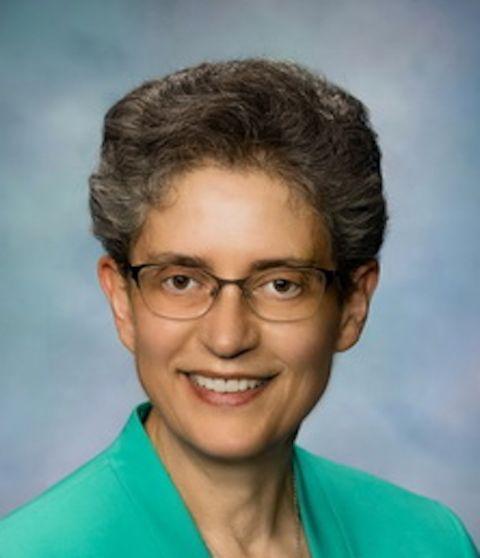
Sr. Mary Thomas, (Courtesy of the PBVM Sisters)
"These are times that shake one's soul," Thomas said. "Mission is very important right now. You've got to be very clear-thinking on what you are about."
Fortunately, she said, the health system has invested heavily in e-medicine. E-medicine uses technology to allow a health care professional to diagnose patients, prescribe medicines or order treatment for patients who are not on-site, even if they are hours away from a hospital.
"It's like a person being in the room with you," Thomas said. "We said long ago, people living in a rural community should not have a lower level of service. This allows us to do that."
E-medicine also allows patients who may have COVID-19 to be diagnosed at, say, a small, rural clinic near their homes rather than having to travel to a hospital in a larger area, where they could expose many more people. That has also led to a reversal in the usual status quo, she said: Being in a rural, isolated area might now be safer than being in a heavily populated urban area because it's easier to avoid people who might be carrying the virus.
Like most hospitals, Thomas said, Avera facilities don't have enough personal protective equipment for health care providers, and the pharmacy has begun making its own hand sanitizer.
"We're trying to prepare for a surge that we hope never happens," she said. "As for the financial side of all this — we'll just have to deal with that when it's over."
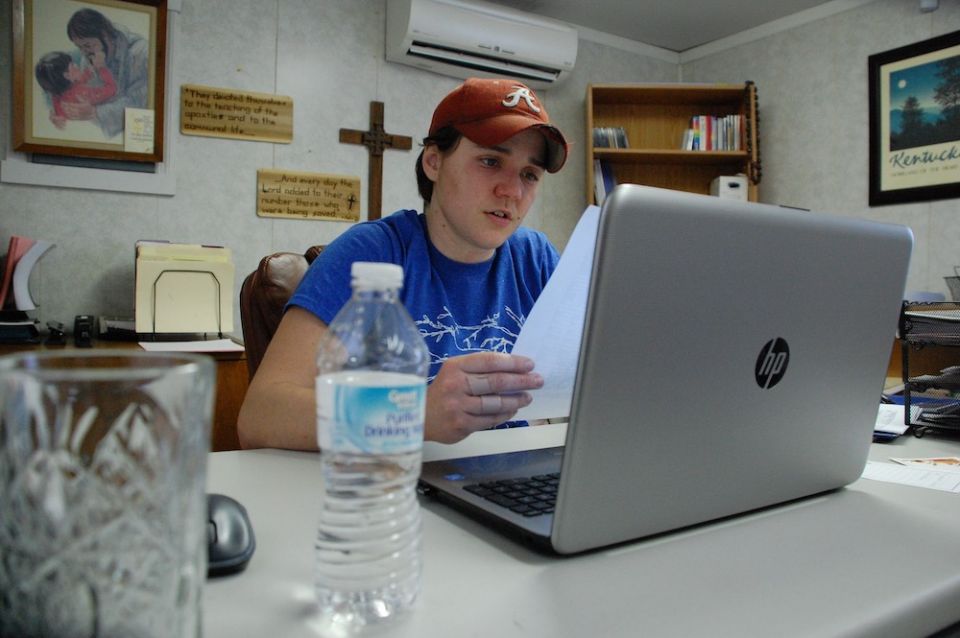
St. Vincent Mission Executive Director Erin Bottomlee looks over reports of volunteer work done to help the poor living in the area around David, Kentucky, in 2017. (GSR file photo)
For some organizations, the virus changes everything
The pandemic is affecting rural areas in other ways, as well: Organizations that depend on groups of volunteers over spring break and summer vacation are seeing only cancellations. Erin Bottomlee, executive director of St. Vincent Mission in David, Kentucky, said the cancellations mean homes in the area may not get roofs or wheelchair ramps or other needed repairs. Volunteers are so important in Appalachian coal country that many organizations build bunkhouses for groups to stay in while they serve. The bunkhouse at St. Vincent Mission can hold up to 42 people.
Bottomlee’s predecessor, Benedictine Sr. Kathleen Weigand, serves part-time at the mission and is a guiding presence there. Sr. Eileen Schepers, prioress of the Mt. Tabor Benedictine Monastery, is co-chair of the mission's board of directors.
Volunteer groups generally pay the mission about $250 per person. This covers building supplies and use of the bunkhouse, but it also goes toward staff salaries and other costs. With cancellations, the costs will have to be made up some other way, Bottomlee said.
In addition, the home visits that would normally be done now to prepare for the volunteers can't be done for fear of spreading the virus. St. Vincent Mission's food pantry now is operated as a drive-through, classes the mission offers have been canceled, and the thrift store is closed.
"We used to deliver food and visit with people," Bottomlee said. "Now, we're just dropping food on the porch and leaving."
One silver lining, she said, would be if groups that cannot send volunteers still send money. Then the agency could hire local workers instead, giving the economy a badly needed boost.
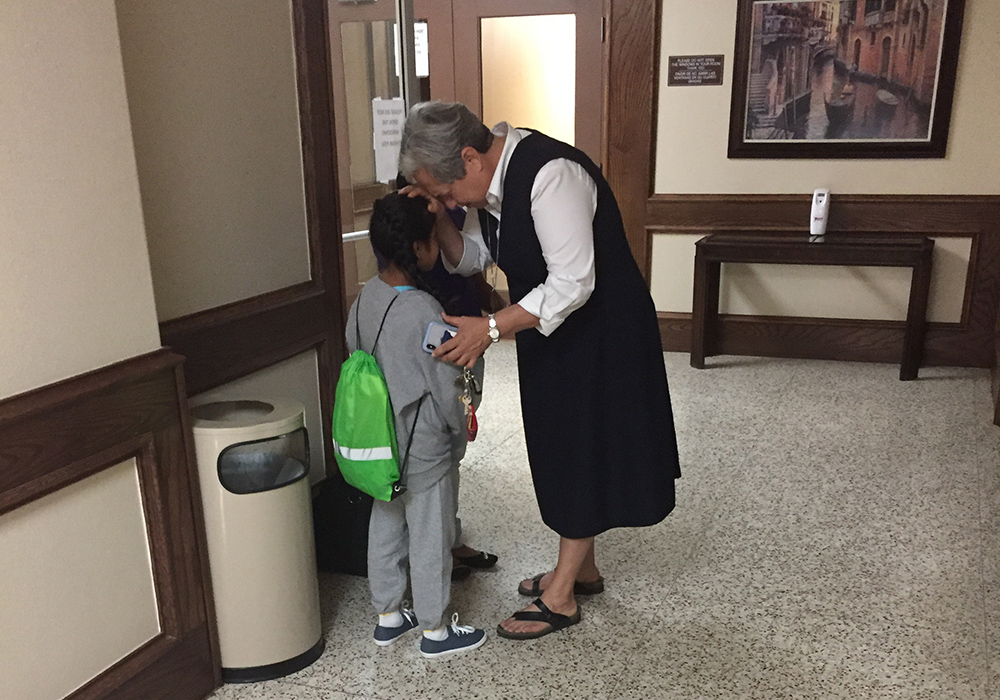
Sr. Norma Pimentel prays with a girl who has been separated from her family in July 2018 at Our Lady of San Juan National Shrine Basilica Hotel. (Courtesy of Catholic Charities of the Rio Grande Valley)
A focus on local needs also is being seen on the United States' southern border.
Sr. Norma Pimentel, a Missionaries of Jesus sister, is executive director of Catholic Charities of the Rio Grande Valley in Brownsville, Texas. She runs the Humanitarian Respite Center, caring for migrants released by U.S. Immigration and Customs Enforcement and U.S. Border Patrol.
More than 150,000 migrants have passed through the agency's doors since 2014, but those numbers have dropped dramatically with the Migrant Protection Protocols, or the "Remain in Mexico" policy, Pimentel said. That has allowed her agency to better serve local residents and gear up for the needs that will increase if COVID-19 infections rise in the area.
"This is one of the poorest communities in the nation," Pimentel said. "So we're organizing to deliver food to the elderly, and at the downtown Humanitarian Respite Center, we're feeding the homeless."
Catholic Charities is assisting agencies serving the approximately 2,500 people on the Mexico side of the border who are waiting for asylum hearings, including gearing up for a medical response if the virus arrives.
"If the virus does hit there, it's going to be difficult to contain," she said. "We're building a separate tent and working with Mexican authorities."
But things have changed dramatically from when buses filled with people released from detention would arrive at the Humanitarian Respite Center daily needing food, clothing and shelter.
"The focus is very different," Pimentel said. "Now, our focus is more on the people [already] here."
So many hospitals around the U.S. and the world were started by Catholic sisters. Today, though sisters are fewer, they continue their legacy of healthcare leadership and have broadened efforts to help poor and vulnerable people.
Alone, or with a partner, consider:
- What might the coronavirus situation be like without hospitals founded or led by sisters?
- What do you hope to be known or remembered for someday?
- How might you make your legacy a reality?
Jesus' first followers found themselves in a scary situation when a storm surged and began to sink their boat. In fear, they turned to Jesus to save them:
"Jesus was in the stern, asleep on a cushion. They woke him and said to him, 'Teacher, do you not care that we are perishing?' He woke up, rebuked the wind, and said to the sea, “Quiet! Be still!”* The wind ceased and there was great calm."
Mark 4:38-39 [click here to read the entire story]
Pope Francis reflected on this story when he led the world in prayer on March 27. The pope said:
"We find ourselves afraid and lost. Like the disciples in the Gospel we were caught off guard by an unexpected, turbulent storm. We have realized that we are on the same boat, all of us fragile and disoriented, but at the same time important and needed, all of us called to row together, each of us in need of comforting the other. On this boat… are all of us. Just like those disciples, who spoke anxiously with one voice, saying 'We are perishing' (v. 38), so we too have realized that we cannot go on thinking of ourselves, but only together can we do this."
Pope Francis, Extraordinary Moment of Prayer in Time of Epidemic
Alone, or with a partner, consider:
- How has the pandemic capsized your life?
- "We're all in the same boat” can seem like a cliché. What difference does it make to have Jesus in the boat?
- In what ways are your gifts and efforts needed to help row through this crisis?
In his March 27 reflection, the pope emphasized the sacrifices – great and small – we make together to respond to coronavirus. He said:
"It is the life in the Spirit that can redeem, value and demonstrate how our lives are woven together and sustained by ordinary people – often forgotten people – who do not appear in newspaper and magazine headlines nor on the grand catwalks of the latest show, but who without any doubt are in these very days writing the decisive events of our time: doctors, nurses, supermarket employees, cleaners, caregivers, providers of transport, law and order forces, volunteers, priests, religious men and women and so very many others who have understood that no one reaches salvation by themselves. In the face of so much suffering, where the authentic development of our peoples is assessed, we experience the priestly prayer of Jesus: 'That they may all be one' (John 17:21). How many people every day are exercising patience and offering hope, taking care to sow not panic but a shared responsibility."
Pope Francis, Extraordinary Moment of Prayer in Time of Epidemic
Alone, or with a partner, consider:
- Name people you know in the fields that Pope Francis mentions and thank God for them in prayer. [If you encounter these people - doctors, grocery clerks, bus drivers, priests, sisters or other helpers - thank them, too!]
- What does it mean to say “no one reaches salvation by themselves?”
- In such a divided world, how can we possibly achieve Jesus’ desire that all may be one?
Network, the Catholic social justice organization inspired by Catholic sisters, takes an active role in lobbying national leaders about healthcare and provides regular updates about legislation related to the coronavirus pandemic. Explore more about Network’s work and how you can get involved.
It’s difficult to get out and take action when we're being called to stay inside to slow the spread of coronavirus. Instead, consider taking inward action by learning about meditation. Spiritual reading of sacred scripture, known as lectio divina, is an important way to meditate. There are many ways to do it.
Fr. James Martin, S.J., offers one method in this brief video. His four key questions to ask when reading scripture are:
- What does the text say?
- What does the text say to me in my own life?
- What do I want to say to God about the text?
- What difference will this text make in my life?
In these turbulent times, try lectio divina with the story [mentioned in the video] of Jesus calming the storm.
To learn more about meditation, check out this lesson, which offers a sister’s suggestions on dealing with isolation.
"Lord, may you bless the world,
give health to our bodies
and comfort our hearts.
You ask us not to be afraid.
Yet our faith is weak
and we are fearful.
But you, Lord, will not leave us
at the mercy of the storm.
Tell us again: 'Do not be afraid'
And we, together with Peter,
'cast all our anxieties onto you,
for you care about us.'
Pope Francis, Extraordinary Moment of Prayer in Time of Epidemic
Tell us what you think about this resource, or give us ideas for other resources you'd like to see, by contacting us at education@globalsistersreport.org
